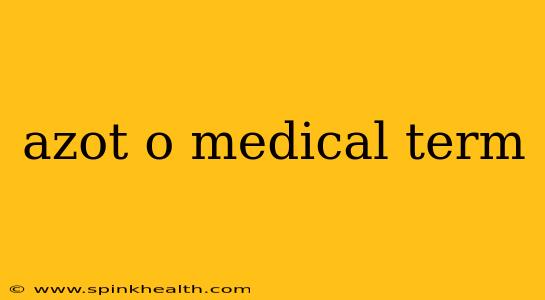Azot: Unraveling the Medical Mystery Behind This Term
The word "azot" might sound like something out of a science fiction novel, but it actually has a rich history within the world of medicine and chemistry. While not commonly used in modern medical terminology in English-speaking countries, understanding its meaning and historical context sheds light on the evolution of our understanding of gases and their role in the human body.
Let's embark on a journey to uncover the secrets behind this intriguing term.
What Does Azot Mean?
Historically, "azot" was an older term for nitrogen. This archaic term finds its roots in the late 18th and early 19th centuries when chemists were actively exploring the properties of gases. The name itself derives from the Greek words "a-" (meaning "without") and "zoe" (meaning "life"). Early chemists noted that nitrogen, unlike oxygen, didn't support life as we know it. Hence, the name "azot," meaning "without life," became a common descriptor.
While "azot" is largely obsolete in English-speaking medical literature, it remains present in some languages and niche scientific contexts. Its survival serves as a fascinating reminder of the historical development of scientific nomenclature.
Why Isn't Azot Used Anymore?
The simple answer is that the term "nitrogen" ultimately prevailed as the internationally accepted standard. The standardization of chemical nomenclature aimed for clarity and global communication amongst scientists. "Nitrogen" offered a more concise and universally understood term, rendering "azot" redundant.
What Role Does Nitrogen (Azot) Play in the Body?
While the term "azot" might be a relic of the past, its chemical counterpart, nitrogen, plays a crucial role in human physiology. Nitrogen is not directly involved in respiration in the way oxygen is, but it's a vital component of:
- Amino acids: These are the building blocks of proteins, essential for countless bodily functions, from muscle growth to enzyme production.
- Nucleic acids (DNA and RNA): Nitrogen is crucial for the structure and function of our genetic material, controlling inheritance and protein synthesis.
- Other essential biomolecules: Nitrogen is found in various other vital molecules, contributing to the overall health and functioning of the body.
Nitrogen deficiency is rare in developed countries due to a rich diet in protein-containing foods. However, in regions with limited access to nutritious foods, nitrogen deficiency can lead to significant health problems.
What are the Medical Implications of Nitrogen Imbalances?
Although rare in developed nations, imbalances in nitrogen metabolism can have significant health consequences. Conditions like:
- Uremia: A buildup of nitrogenous waste products in the blood, often a consequence of kidney failure.
- Hyperammonemia: Excessive ammonia levels in the blood, linked to liver dysfunction.
Highlight the importance of proper kidney and liver function in maintaining nitrogen balance. These vital organs regulate nitrogen metabolism, preventing dangerous accumulation of waste products.
How is Nitrogen Metabolism Studied in Medicine?
Measurements of blood urea nitrogen (BUN) and creatinine levels are common clinical tests used to assess kidney function and nitrogen metabolism. These tests indicate the body's ability to effectively filter and excrete nitrogenous waste.
In conclusion, while "azot" itself might be an antiquated term, its story provides a captivating glimpse into the historical evolution of scientific understanding. The substance it refers to, nitrogen, remains a cornerstone of life, emphasizing the crucial role of this element in human health and biology. Understanding nitrogen's role helps us appreciate the intricate workings of the human body and the significance of maintaining proper metabolic balance.

